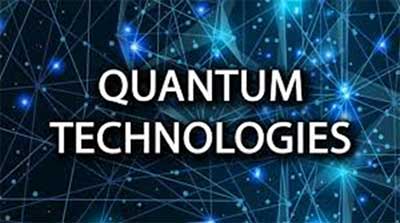Relevance: GS-3: Science and Technology- developments and their applications and effects in everyday life.
Key phrases: Quantum Technology, Qubit, Superposition, Entanglement, Quantum Computing.
Why in News?
- With the due support from the National Security Council Secretariat (NSCS), the Army has established the Quantum Lab at Military College of Telecommunication Engineering, Mhow (MP) MCTE to lead research and training in this key developing field
What are Quantum Technologies?
- Quantum technology is a class of technology that works by using the principles of quantum mechanics (the physics of sub-atomic particles), including quantum entanglement and quantum superposition.
- Quantum Technology is based on the principles of quantum theory, which explains the nature of energy and matter on the atomic and subatomic level. It concerns the control and manipulation of quantum systems, with the goal of achieving information processing beyond the limits of the classical world.
- Quantum principles will be used for engineering solutions to extremely complex problems in computing, communications, sensing, chemistry, cryptography, imaging and mechanics. Quantum field has not yet matured for commercialization, due to the extreme scientific challenges involved.
What is quantum entanglement?
- Quantum entanglement is when two atoms are connected, or entangled, despite being separated. If you change the properties of one of them, the other changes instantly. In theory, this would be the case even if the entire universe separates the entangled atoms. If that wasn’t spectacular enough, quantum mechanics says simply observing an atom changes its properties.
- One possibility this creates is in enhancing the security of communication through quantum protected cipher keys. You can use entangled atoms to detect whether someone has interfered with the transmission of data
- For example, you can have two entangled atoms with clockwise and anticlockwise ‘spins’. One atom is sent with the encryption key and if an eavesdropper intercepts the transmission, this causes a change in the ‘spin’ of the atom, affecting the overall quantum state of the system and resulting in the detection of the eavesdropping attempt.
What is quantum superposition?
- Quantum superposition is the theory that sub-atomic particles exist in multiple states simultaneously.
- The practical application of this mind-bending version of reality is most obvious in quantum computers. While digital computers store data as bits (the ones and zeros of binary), quantum computers use qubits that exist as a one, zero or both at the same time.
- This superposition state creates a practically infinite range of possibilities, allowing for incredibly fast simultaneous and parallel calculations.
Is India working on Quantum Technologies?
- Globally, research in this area is about two decades old, but in India, serious experimental work has been under way for only about five years.
- In 2018, the Department of Science & Technology unveiled a programme called Quantum-Enabled Science & Technology (QuEST) and committed to investing ₹80 crore over the next three years to accelerate research.
- The government in its budget 2020 has announced a National Mission on Quantum Technologies & Applications (NM-QTA) with a total budget outlay of Rs 8000 Crore for a period of five years to be implemented by the Department of Science & Technology (DST).
- The Indian government has launched the country’s first quantum computer simulator toolkit, called QSim, which will enable researchers and students to carry out cost-effective research in quantum computing.
National Mission on Quantum Technologies & Applications (NM-QTA)

Applications of Quantum Technologies:
- Electronics: Many modern electronic devices are designed using quantum mechanics. Examples include the laser, the transistor (and thus the microchip), the electron microscope, and magnetic resonance imaging (MRI).
- Cryptography: Researchers are currently seeking robust methods of directly manipulating quantum states. Efforts are being made to develop quantum cryptography, which will theoretically allow guaranteed secure transmission of information.
- Quantum computing: Another goal is the development of quantum computers, which are expected to perform certain computational tasks exponentially faster than classical computers. Instead of using classical bits, quantum computers use qubits, which can be in superpositions of states. Quantum programmers can manipulate the superposition of qubits in order to solve problems that classical computing cannot do effectively, such as searching unsorted databases or integer factorization.
- Their applications which will receive boost include those in aero-space engineering, numerical weather prediction, simulations, securing the communications & financial transactions, cyber security, advanced manufacturing, health, agriculture, education and other important sectors with focus on creation of high skilled jobs, human resources development, start-ups & entrepreneurship leading to technology lead economic growth.
- Quantum technology is opening up new frontiers in computing, communications, cyber security with wide-spread applications. It is expected that lots of commercial applications would emerge from theoretical constructs which are developing in this area.
- Disaster Management: Tsunamis, drought, earthquakes and floods may become more predictable with quantum applications.
- Research: It can help in solving some of the fundamental questions in physics related to gravity, blackhole etc. Similarly, the quantum initiative could give a big boost to the Genome India project, a collaborative effort of 20 institutions to enable new efficiencies in life sciences, agriculture and medicine.
Way Forward:
- Quantum technology is open new frontiers in computing, communications, cyber security with wide-spread applications. It is expected that lots of commercial applications would emerge from theoretical constructs which are developing in this area. India is currently at the forefront of tapping the second quantum revolution through massive investments in the field.
Source: News On Air
Mains Question:
Q. What do you understand by Quantum technology? What is the possible application of Quantum Technology? Illustrate.







